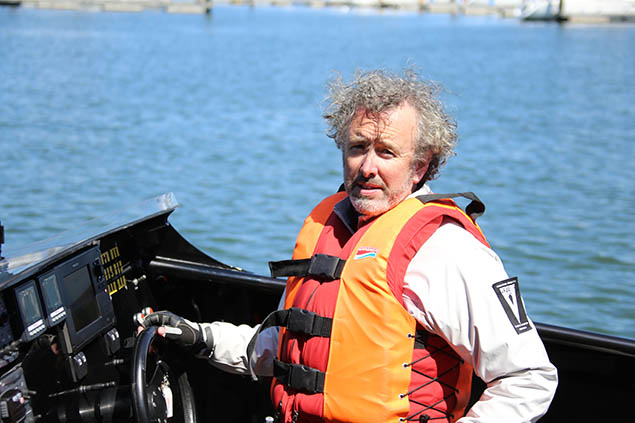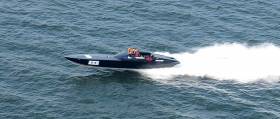Displaying items by tag: Offshore powerboating
Hibernia Racing, The International Irish Marathon Offshore Powerboat Racing Team headed by driver and throttle man John Ryan are set to take on their toughest challenge to date; the Cowes Classic 2016 Offshore Powerboat Race. The race takes place this Sunday, September 4th, starting at Cowes on the Isle of Wight with 'Hibernia Racing' being the first Irish boat to ever enter the race.
The Hibernia team includes Phillip Fitzgibbon navigating, Denis Dillon dealing with logistics and on-board hydraulic monitoring. Jonathan Napier is co–driver, Jonathan was famously the last Concorde flight pilot.
The mechanics include Christoff, Piotr and Mark Soper from the boats engine manufacturer FPT.
 John Ryan driver and throttle man of Team Hibernia – realistic about chances in Cowes Photo: Afloat.ie
John Ryan driver and throttle man of Team Hibernia – realistic about chances in Cowes Photo: Afloat.ie
The team is also supported by Dingle's Tom Crean's lager, the Isle of Wight Distillery's Mermaid Gin and Henri Lloyd clothing.
The 200–mile classic has long been recognised as one of powerboating’s toughest challenges, it's the longest running offshore powerboat event in the world and comparisons have been made with motorsport events such as Le Mans and the Indy 500.
Around 20 boats are expected to be in the line-up for this high speed challenge including some boats with over 3000 hp available to drive their boats at speeds in excess of 210 km per hour.
Ryan is realistic about the teams chances saying that "we're in this to genuinely compete against the best teams and boats in the world, we know that our boat doesn't have the top speed or power of a lot of the other competitors but we have proven our overall reliability and high performance with our recent Round Ireland World record so hopefully at the end of the race we'll be up there with the best, remember to win you first have to finish!





























































